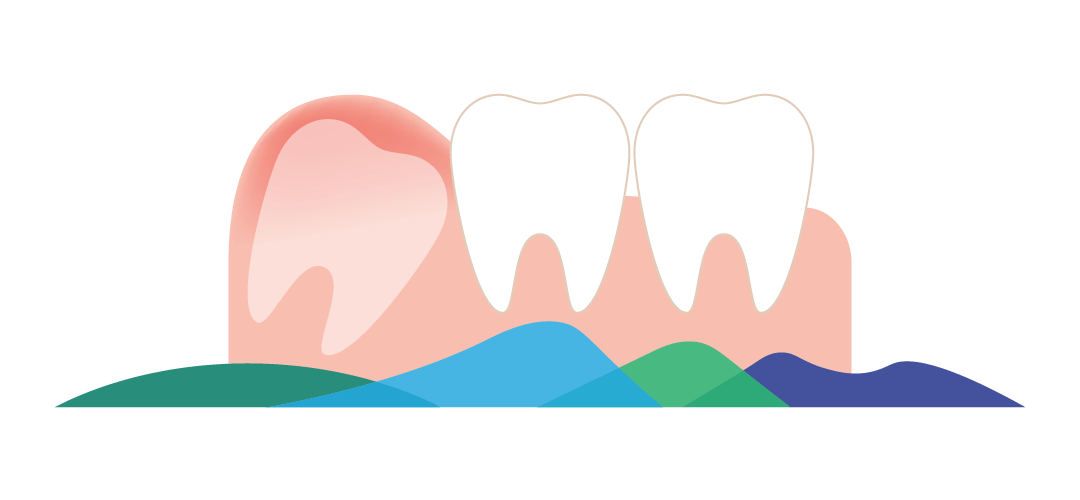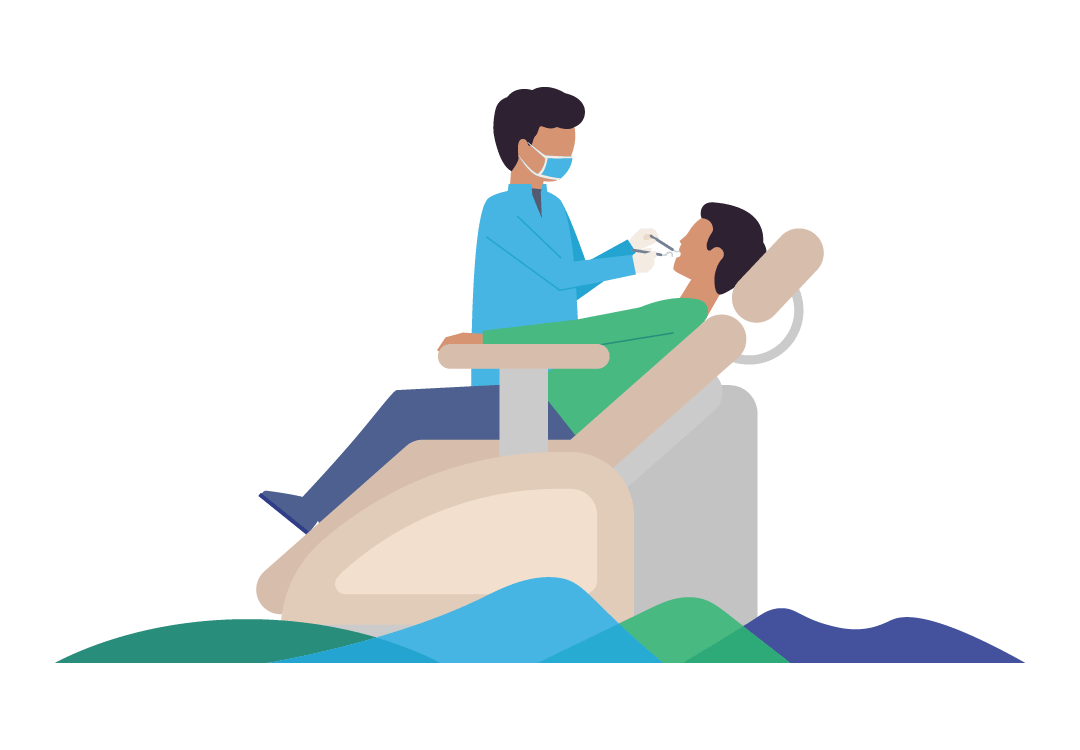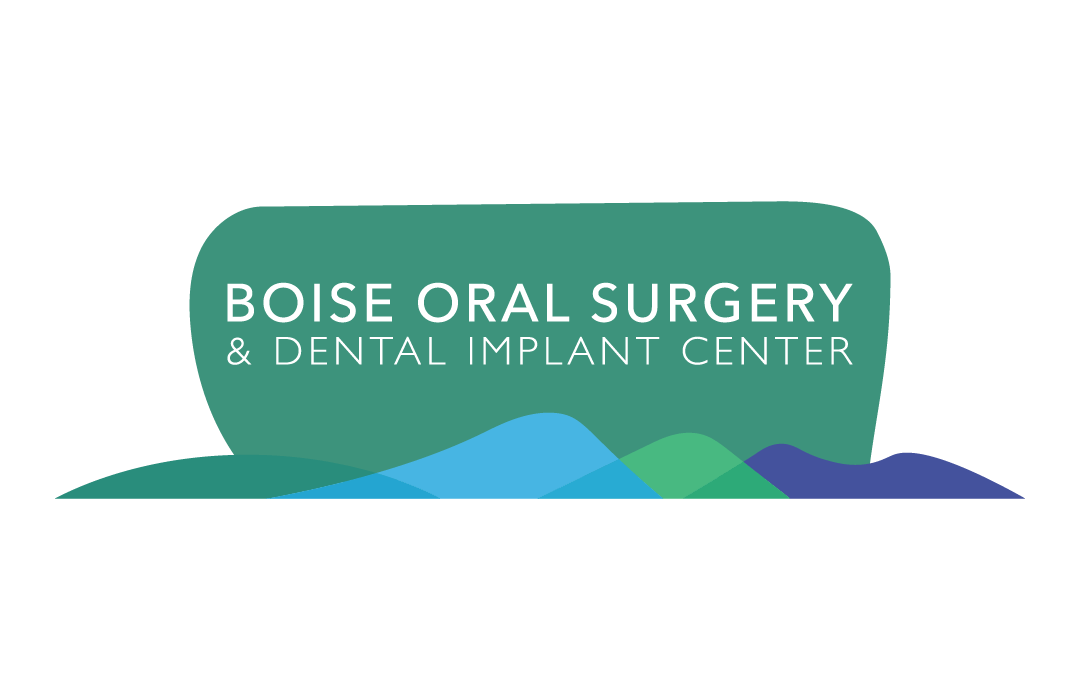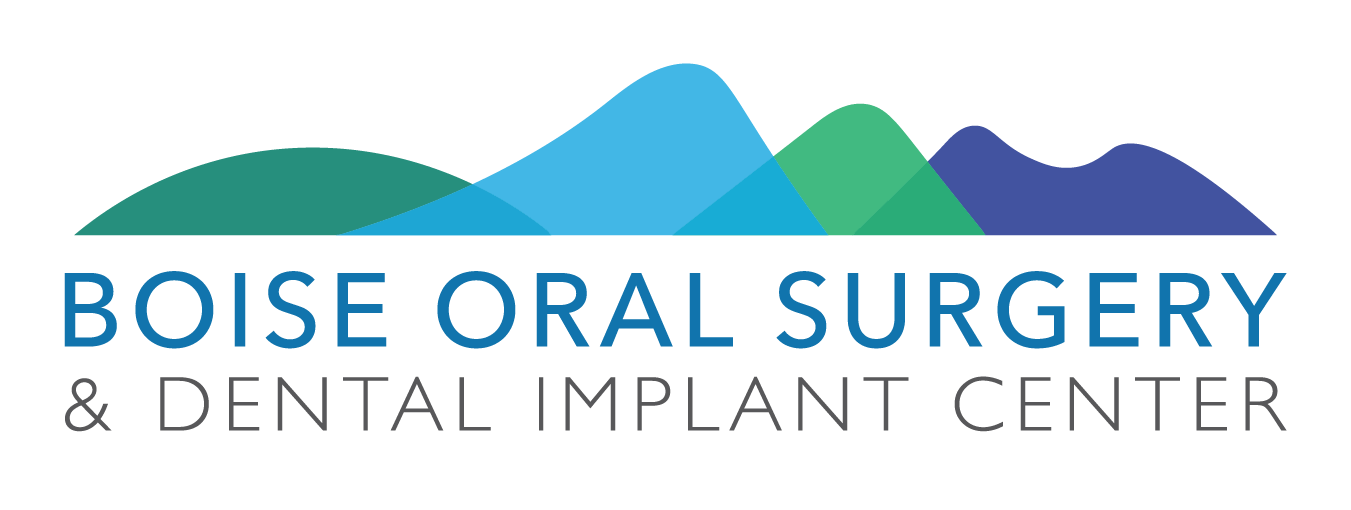Oral Surgery Resource Guide
Your Guide to Oral Surgery in Boise, Idaho
Home / Resources / Oral Surgery Resource Guide
Oral SurgeryTable of Contents:
- What Is Considered Oral Surgery?
- What Are the Different Types of Oral Surgery?
- Who Can Perform Oral Surgery?
- Why Is an Oral Surgeon Your Best Bet?
- When Might You Need Oral Surgery?
- How Do You Prepare for Oral Surgery?
- How Long Does It Take to Recover from Oral Surgery?
- Are There Ways to Speed Recovery from Oral Surgery?
- How Do You Find the Best Oral Surgeon?
- Why Choose Boise Oral Surgery for Your Oral Surgery Procedure?
- Hear What Our Oral Surgery Patients Are Saying
- Contact Boise Oral Surgery and Dental Implant Center

What Is Considered Oral Surgery?
Patients looking for dental care have several options when it comes to dental providers. However, when you have an issue with your teeth or jaw it can be difficult to know which type of dental professional you should see for the necessary treatment. Therefore, it is important to understand the differences between general dentists and oral surgeons, so you can make a better choice about which is right for you.
At its most basic description, oral surgery is any surgical procedure that involves the area around your mouth or jaw. Oral surgery goes beyond the scope of what a normal dentist can do in their office. Though it might seem like a scary prospect to need oral surgery, many of the procedures performed by oral surgeons are routine and their recoveries are short, though each case is different. The aim of oral surgery is to fix tooth or bone damage, remove any related problem teeth, and to help keep your smile healthy for as long as possible.
In most cases, your dentist may recommend oral surgery if they notice an issue during a routine examination. If your dentist recommends oral surgery, you may feel apprehensive at first, but they should be able to talk you through why they recommend the procedure and how it can help your condition. They will be able to recommend a trusted oral surgeon in your area that they have a working relationship with.
What Are the Different Types of Oral Surgery?
Oral surgery comes in many different forms, from common, routine procedures to complex restorative operations. Oral surgery often involves the mouth, though oral surgeons may also perform maxillofacial surgery, which involves the bone or tissue of the face or jaw. Because these parts of your body are interconnected, an oral surgeon is well-versed in treating health issues comprehensively.
On one end of the spectrum, oral surgery can be a fairly quick outpatient procedure, with only a day or two of recovery time needed. On the other hand, procedures that require reconstruction of the face or jawbone bone are intensive and may take weeks of recovery and healing. In these cases, your jaw may need to be wired shut for proper healing, and you may need to stay overnight in the hospital following surgery.
For quick, routine procedures, you may only need a local anesthetic, like Novocain, while for more complicated surgeries, you may need to be put under anesthesia. Your surgeon will know what is best for your case and will make sure you understand what will happen during the procedure in depth at a consultation appointment prior to the actual day of your surgery.


Who Can Perform Oral Surgery?
General dentists can complete minor oral surgical procedures like root canals and tooth extractions. They also perform routine care like cleanings, x-rays, fillings, crowns, and dental exams. Any treatment required beyond that general scope should have consideration for outsourcing to a specialist such as an oral surgeon. A general dentist is skilled in their field and do however they do have specific in-depth training necessary to safely complete specialized oral surgery such as those listed in the When Might You Need Oral Surgery? section of this guide. This is where a line is drawn between a dentist and an oral surgeon. An oral surgeon gets additional training after dental school that includes such surgical techniques.
Your general dentist plays an especially important role. They are your first stop for oral healthcare and are key to preventing many oral issues through proper proactive maintenance. They can tell you whether they can treat your problem or whether they will need to refer you to an oral surgeon for more further care. Think of your dentist as your primary care provider for anything related to oral health, while an oral surgeon is a specialist who can treat specific issues you may have that require surgery.
Why Is an Oral Surgeon Your Best Bet?
Oral surgeons have specialized training to ensure they are well-versed in complicated surgeries. Both dentists and oral surgeons start with a bachelor’s degree and then move on to dental school to obtain a dental degree. Some oral surgeons have a medical degree instead of a dental degree, and all oral surgeons go through a four-year residency after their schooling is complete, and before they can practice independently. Due to this further training, an oral surgeon is prepared to handle complex or unusual cases and will know all the latest and safest surgical techniques.

Dentists often work closely with oral surgeons by referring cases to oral surgeons that are more complex to help ensure the patient receives the best possible treatment for their unique scenario. Oral surgeons are equipped with extensive training including how to administer IV sedation for this very purpose. If you need to go under anesthesia during your procedure, your oral surgeon is an expert in using it safely and quickly solving any problems or complications that may arise during anesthesia.
When Might You Need Oral Surgery?
There are a variety of scenarios in which oral surgery is a necessity to repair issues with your mouth, teeth or jaw. Here are a few of the most common issues that oral surgery can treat.
Wisdom Tooth Removal
Wisdom tooth removal is a common oral surgery where a person’s third set of molars is removed. These molars can cause pain, tooth crowding, and other issues in many people, so they are often removed either as a preventive measure, or to relieve pain and discomfort. Sometimes wisdom teeth are impacted, meaning they are growing under your gums. In this case, the recommended surgery involves cutting into the gum to remove the tooth and stitching up the surgical site.
Dental Implants
Missing or damaged teeth can often be embarrassing and unsightly or cause pain or difficulty when chewing. To replace missing or damaged teeth, your dentist may recommend dental implants. These are a natural-looking option, where titanium screws are inserted into your jawbone and an artificial tooth is placed onto the implant to fill in the gaps in your smile. There are different types of dental implants depending if you need to replace a single missing tooth or a whole smile.
General Extraction
General extractions are a routine oral surgery procedure where an oral surgeon removes one or several teeth. If you have pain in a tooth, or it is damaged beyond repair due to decay, disease, or trauma, a dentist may recommend getting your tooth removed by an oral surgeon. This is a simple procedure that is completed within a few minutes and usually only requires local anesthesia.
Zygomatic Implants
While dental implants are a preferred method of replacing missing or damaged teeth, a patient’s jawbone may not be strong or stable enough to support the implants. If this is the case, your oral surgeon may recommend zygomatic implants. Instead of being inserted into your jawbone, these implants are inserted into your zygomatic bone, which is also known as your cheekbone. When compared to traditional dental implants. this procedure has its pros and cons, but it is quite safe and can also be used as an alternative to bone grafts or if you are unable to get implants.
Bone Grafting
Missing teeth, dental disease, and poor oral hygiene can lead to deterioration of the jawbone. A weakened jawbone can make tooth replacement and dental implants difficult to impossible, as they need a solid foundation to be inserted into. Luckily, it is relatively easy to strengthen and restore a jawbone through bone grafting. Bone graft material from your own bones or mineral bone substitute is used to fill in the socket of a lost tooth, prompting your body to regenerate bone. Bone grafting is often needed before you get dental implant surgery.
Exposure and Bonding Impacted Canine Teeth
In some instances, teeth do not properly erupt through the jaw and gums. While this often happens with wisdom teeth, canine teeth are commonly affected as well. Canine teeth are important for chewing, and impacted canine teeth can lead to further issues, so it is necessary to help the tooth get into the proper positioning. In this procedure, the tooth is uncovered from the gum, and an orthodontic attachment is added to gently move the tooth into the right spot.
Jaw Pain
If you are experiencing any pain in your mouth and jaw, an oral surgeon can help determine the problem and the solution. For instance, your jaw may be misaligned. While there are other options for fixing jaw alignment complications, surgery is an option if they fail.
Facial Trauma
Trauma from an injury, illness, or accident can lead to lost teeth or a damaged or fractured jaw. When not treated properly, your facial or jawbones may not heal correctly, leading to further problems. Oral surgery can repair this damage and help to restore the function of your teeth and mouth. They can also realign your jaw if it was healing incorrectly after trauma.
This is not a comprehensive list of the conditions that necessitate oral surgery. It is important to talk with your dentist and an oral surgeon to fully understand your condition and how oral surgery can help.

How Do You Prepare for Oral Surgery?
Depending on the seriousness of the surgery you are getting, you will want to prepare first by talking to your oral surgeon and asking them what you can expect during and after the procedure. Oral surgery is like other types of surgery in that you will need some time to rest and recover afterward. This means that before going into the surgeon’s, set up a comfortable area of your home located close to the things you need so you will not have to get up more than necessary during recovery. This may be a bedroom or a couch, with plenty of pillows so you can sit at an incline if necessary.
Clean up your space as much as you can so you do not have to worry about tidying up in the days following your surgery. Remember, you may experience pain or discomfort, so consider what will make you feel most comfortable and relaxed when you return home. A few favorite movies, books, or shows can help distract and keep you occupied as you recover.
Stock up on healthy foods and drinks you will be able to consume safely. For most oral surgery, this may mean soft or blended foods, or in some cases, liquid nutrition. If you will be going under anesthesia during your surgery, you will also need someone to drive you home after the procedure, as it takes a little time to fully recover from the effects of anesthesia. For more complicated procedures, it may be helpful for a friend or relative to check in on you during the days of your recovery. Depending on the complexity of your surgery, you may want to take a few days off from your job as well, so you have plenty of time to rest and recover.
Do not forget to talk to your surgeon to know about any other special precautions you need to take before and after your surgery. If you are going under anesthesia, you will need to refrain from eating or drinking for at least 8 hours prior to the procedure.
How Long Does It Take to Recover from Oral Surgery?
Since oral surgeries range in complexity, the time you need to heal can range from a few days to weeks. It is important to talk to your surgeon about what to expect during the recovery process. Ask what symptoms are normal during this time, so it is easier for you to notice if anything seems to be off. Though a little pain, bleeding, tenderness, and swelling are expected after oral surgery, watch out for extreme pain, bleeding or fever as these can be a sign of more serious complications. If any of these occur, contact your oral surgeon immediately.

Are There Ways to Speed Recovery from Oral Surgery?
Following your surgeon’s orders closely is the most important thing you can do to ensure a quick and successful recovery. Always take any medication your doctor prescribes. If you are not prescribed a pain reliever, an over the counter one can help to reduce pain, and ice packs can bring down swelling and inflammation. As you recover, be sure to stay hydrated, get plenty of rest, and stay away from intensive activity. For basic surgeries like extractions, you can return to normal activities the next day, but for more complex surgeries, you may need to spend a few days or weeks in recovery.

Your oral surgeon may caution you against using straws which could pull out a blood clot. Avoid drinking alcohol, smoking, and eating hard or crunchy foods, and follow direction on how long to eat soft foods.
Your oral hygiene routine may need to change as well. Brushing, flossing, or using an alcohol-based mouthwash may irritate the surgical site, so be sure to ask your surgeon what you can do to keep the area clean. In most cases, rinsing with a solution of warm water and salt can help loosen any debris, keep your mouth clean, and promote healing.
In the weeks following your surgery, you may need to follow up with your surgeon regarding progress. During this appointment, they can make sure everything is healing correctly. In the case of a multi-step procedure like dental implants, it is important to follow up regularly so stay on top of when it is time to proceed to the next phase of your procedure.
How Do You Find the Best Oral Surgeon?
Before deciding on an oral surgeon, be sure to spend time talking to them to learn more about their qualifications. Ask how often they have performed the surgery you need and make sure they have plenty of experience with the procedure. It is important to actually meet and speak with an oral surgeon through a consultation to make sure they are knowledgeable and trustworthy of your situation. Finding a surgeon you trust is the most important thing!

You should be able to look online and find reviews about an oral surgeon before meeting with them in person. Good oral surgeons will be upfront about their education, training, and background, and will not hesitate to answer your questions and ease your fears. Because so many people have a fear of dental procedures, compassion is an important trait in an oral surgeon.

Why Choose Boise Oral Surgery for Your Oral Surgery Procedure?
At Boise Oral Surgery, we specialize in the latest surgical techniques to reduce your recovery time and get you back to your normal routine in the quickest way possible. Our experienced team can help to decide which option is best for your case and discuss what your treatment plan will look like. We know oral surgery can be a bit of an intimidating prospect, so we try to make it as painless as possible. If you are feeling wary after your dentist recommends oral surgery, Boise Oral Surgery is here to put your mind at ease. Dr. Bobst, DDS has more than ten years of experience in oral surgery so you can come to our office knowing you are getting the best treatment available.
Hear What Our Oral Surgery Patients Are Saying
If you need an experienced and compassionate oral surgeon in the Boise, Idaho area, contact us today to learn more about your options and how we can help restore your smile! We also highly recommend checking out our patient testimonial videos to hear what others say about the type of oral surgery procedure you may need.

Contact Boise Oral Surgery and Dental Implant Center
Submit a contact form or call Boise Oral Surgery and Dental Implant Center at 208-322-5522 to learn how they can help improve your smile. Boise Oral Surgery and Dental Implant Center offers long-term solutions to your complex oral health problems and are happy to answer any questions you have about wisdom teeth so that you can make the right decisions about taking care of your oral health. They offer a wide range of surgical services including wisdom teeth extraction, dental implant placement, bone grafting, oral pathology screening, and facial trauma surgery.
Our Boise Location
Boise Oral Surgery & Dental Implant Center
7910 W Ustick Rd Boise, ID 83704
Main: (208) 322-5522
Hours: Mon–Thu: 7:30 AM–4:30 PM
Fri: 7:30 AM–12:00 PM
© 2026 . All rights reserved. | Boise Oral Surgery • ID Specialty Dental Services, PLLC - Kevin Chad Lambourne, DDS.





